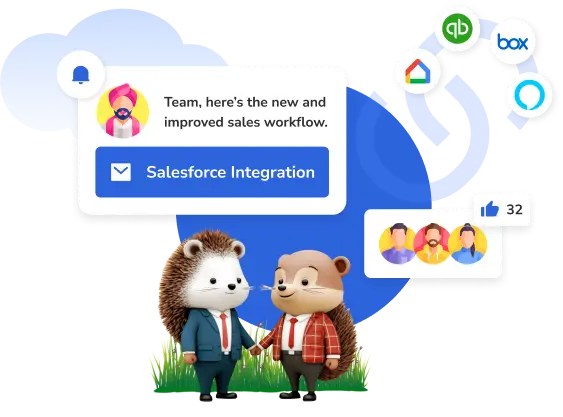
At GetOnCRM, we specialize in Salesforce integration services that connect your CRM with the tools, platforms, and applications that power your business. From ERP and accounting software to e-signature tools and mapping APIs, our tailored integrations ensure your data flows smoothly, your teams work efficiently, and your customers get a better experience.
Whether you need to sync customer data, automate processes, or enhance reporting, our certified Salesforce experts design, implement, and support integrations that fit your business goals.
We deliver secure, scalable, and high-performance integrations across industries and business functions:
Our Infor VISUAL Salesforce integration connects your ERP and CRM to ensure real-time data sync. Automate sales orders, track inventory, and enhance production visibility. The Infor VISUAL ERP Salesforce connector eliminates duplicate entries, enabling accurate, efficient workflows from lead capture to order fulfillment, helping sales teams close deals faster.
With Modives' Salesforce integration, insurance verification becomes seamless. Connect Modives’ API to Salesforce for automated policy checks, real-time insurance data sync, and streamlined customer onboarding. Eliminate manual verification steps and speed up decision-making using Modives insurance verification Salesforce features for accuracy, compliance, and improved customer experience.
Our DocuSign Salesforce integration enables faster deal closures with e-signature workflows directly in Salesforce. Generate, send, and track documents without switching platforms. Store signed contracts automatically for compliance, and use DocuSign e-signature for Salesforce to reduce delays and improve client satisfaction while maintaining secure and verifiable agreements.
Canopy Connect Salesforce integration simplifies insurance data capture and lead management. Sync customer coverage details into Salesforce, automate verification, and manage leads efficiently. With Canopy Connect AppExchange tools, your team gains centralized access to accurate data, reducing processing time and improving sales performance for insurance-driven businesses.
Google Maps Salesforce integration helps teams visualize locations, plan routes, and optimize visits. Embed maps in Salesforce records, use location-based insights for marketing, and improve service delivery. The Salesforce Google Maps API enables lead mapping, account tracking, and territory planning with real-time geographic intelligence.
Our Conga CPQ Salesforce integration streamlines quoting and contract workflows. Automate pricing, approvals, and document generation, ensuring accurate proposals. The Apttus CPQ integration with CRM accelerates the quote-to-cash process, improving revenue efficiency while maintaining compliance through integrated contract management within Salesforce.
QuickBooks and Salesforce integration connect financial and customer data for better insights. Automate invoice creation, payment tracking, and financial reporting. Whether using QuickBooks Shopify integration or API-based workflows, the system ensures synchronized records, reducing errors and providing a complete view of customers and transactions.
Adobe Sign Salesforce integration enables secure, compliant digital agreement management. Send, sign, and store documents directly from Salesforce. With Adobe Sign API integration, teams automate signature processes, track document status, and maintain centralized records, improving turnaround times and customer trust in sensitive transactions.
Our Leaflet Salesforce integration delivers interactive maps and dashboards for location-based insights. Connect Leaflet GIS integration to visualize field service areas, plan routes, and track activity. Integration with Mapbox or OpenStreetMap offers rich, customizable mapping experiences within Salesforce for data-driven decision-making.
Salesforce payment gateway integration enables secure online transactions across eCommerce, mobile, and ERP platforms. Automate payment processing, link with QuickBooks payment gateway integration, and manage multi-platform sales from one CRM. The result—faster order processing, fewer errors, and improved customer checkout experience.
Amazon S3 Salesforce integration provides scalable storage and secure file management. Upload, store, and retrieve documents directly within Salesforce. With Amazon S3 API integration, automate backups, manage large datasets, and ensure disaster recovery readiness while keeping your data accessible for business-critical workflows.
Mailchimp Salesforce integration improves marketing automation with synced contacts and campaigns. Connect Mailchimp CRM integration to track customer journeys, while Mailchimp Shopify integration ensures eCommerce data flows into your campaigns. With Mailchimp API integration, businesses can link websites, WordPress, WooCommerce, and Google Analytics for unified marketing insights and powerful Mailchimp eCommerce integration.
Our TaskRay Salesforce integration provides secure project management with data privacy at its core. Enable TaskRay workflow automation integration, connect with Slack, and strengthen compliance through TaskRay with Salesforce Shield. From secure onboarding to API-based workflows, TaskRay ensures seamless project delivery with TaskRay data privacy integration and document generation support.
PandaDoc Salesforce integration simplifies contract workflows with e-signatures and automation. Use PandaDoc CRM integration to centralize documents, while PandaDoc QuickBooks integration links billing. Through PandaDoc API integration, connect HubSpot, Google Drive, and Zapier. Automate proposals, contracts, and renewals using PandaDoc document automation integration for faster, more secure deal closure.
S-Docs Salesforce integration delivers secure, no-code document automation within Salesforce. Generate PDFs, contracts, and invoices using S-Docs PDF generation integration. Enhance compliance with S-Docs with Salesforce Shield, or extend capabilities via S-Docs API integration and DocuSign. From e-signatures to S-Docs Lightning integration, simplify workflows with native Salesforce document solutions.
Bring intelligence into your CRM with OpenAI Salesforce integration. From GPT-4 chatbots to OpenAI API integration, we help build smart applications. Automate support with OpenAI WhatsApp bot integration, connect workflows using Zapier or Slack, and embed AI assistants directly into business systems for advanced OpenAI integration with apps.
Pinecone vector database integration powers intelligent search and RAG pipelines. Combine Pinecone and OpenAI integration for context-aware AI apps, or link to Pinecone LangChain integration for retrieval workflows. Through Pinecone API integration, teams connect LLMs, Hugging Face models, and cloud storage for efficient, scalable Pinecone search integration solutions.
Enhance scalability with AWS integration with Salesforce and third-party systems. Use AWS Lambda integration and AWS API Gateway integration for serverless automation. Connect S3, ERP, and CRMs with AWS cloud CRM integration. Whether syncing Slack, applications, or analytics, our AWS application integration services drive secure, high-performance cloud workflows.
Our tailored Fred Loya Salesforce integration enables insurance carriers to streamline operations. Automate claims with Fred Loya claims system integration, simplify policies, and power Fred Loya customer portal integration. With secure Fred Loya API integration, digital onboarding and third-party apps align into one ecosystem for efficient insurance management.
Aframe Salesforce integration connects your media workflows to CRM. From Aframe video cloud integration to secure collaboration tools, the platform supports large-scale file sharing. Enhance editing with Aframe integration with Adobe Premiere, or connect DAM systems via APIs. Achieve seamless Aframe cloud storage integration for media teams and enterprises.
Vicidial Salesforce integration powers call centers with CRM-driven workflows. Connect Vicidial VoIP integration, SMS gateways, and even payment processing. With Vicidial API integration, unify customer interactions across WhatsApp, ERP, and websites. This flexible Vicidial CRM integration ensures real-time updates, improved lead handling, and better customer engagement through automation.

Assess business needs and identify integration requirements to ensure alignment with organizational goals.
Develop a detailed integration plan, including timelines, resources, and risk management strategies.
Build and configure the necessary integrations, ensuring they meet the specified requirements.
Connect Salesforce with targeted systems and applications, enabling seamless data flow and functionality.
Rigorously test the integrated systems to identify and resolve any issues before deployment.
Deploy the integration into the live environment, making it available to users.
Assist users in making the most of the linked systems by offering training and continuing assistance.
Companies can connect their Salesforce CRM system to other business applications with the help of Salesforce Integration Services. These services include a wide range of automated data checks guarantee zero data redundancy and maximum accuracy. This helps to increase productivity, reduce operational costs, and streamline operations. Additionally, Salesforce integration services enable seamless access to business data for all teams, providing better customer service and enhancing cross-functional team communication.
Investing in Salesforce integration services can bring various benefits to a business, such as improving efficiency, customer experience, and productivity, reducing costs, and enhancing reporting and analytics. It can streamline business processes, automate manual tasks, provide a unified view of customer data, and enable employees to work more effectively. Overall, Salesforce integration can help improve business outcomes and decision-making.
Businesses should look for Salesforce implementation partner case studies and customer references to evaluate success and experience. You should also consider the company’s rating and how many projects it has completed.
Certifications are essential when choosing a Salesforce implementation partner or Salesforce integration consultant, as they provide dependable services and give the Partner organization legitimacy.
Success depends on finding a Salesforce Partner who can help manage accounts and execute processes. Long-term engagement is the best strategy for customer-centric organizations, as Salesforce-certified specialists have built-in tools for anticipatory risk identification.
Developing a partnership between you and your Salesforce partner is essential for successful software implementation. You must first decide which roles and responsibilities you will perform in software implementation to accomplish this.
Salesforce CRM integrates with various applications and systems to streamline marketing, sales, and customer service processes. It integrates with marketing automation, social media, e-commerce, customer support, analytics and business intelligence, and email and productivity tools.
This allows businesses to manage their marketing campaigns, track leads, engage with customers, manage online sales and customer data, gain insights into sales and marketing data, and manage emails and calendars within Salesforce. Salesforce can be customized to meet the specific needs of a business.
Make an effort to sketch out the data that must be transferred from one system to another. Determine the direction and frequency of data movement after identifying the data to sync.
An API for some external systems, like Salesforce, restricts the amount of data that can be transferred in 24 hours. Document the limits for each system involved in the integration to be ready for these restrictions.
When a record is created or updated, real-time integration takes place immediately. Batch integration takes place over time, not right away. Every integration project must determine and record the integration needed for the best results.
Even though these are the most important things to consider in an integration project, the integration’s success depends on many things related to the individual systems and the goals of the integration.










We are Salesforce Ridge Consulting Partner having 100% salesforce certified team.








Copyright © 2026 GetOnCRM Solutions PVT. LTD. All Rights Reserved.